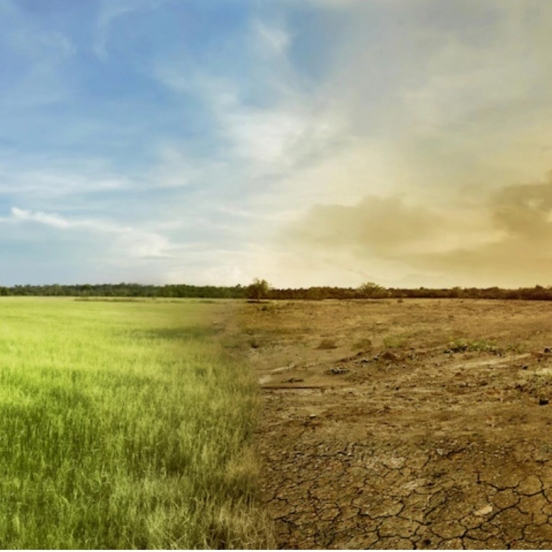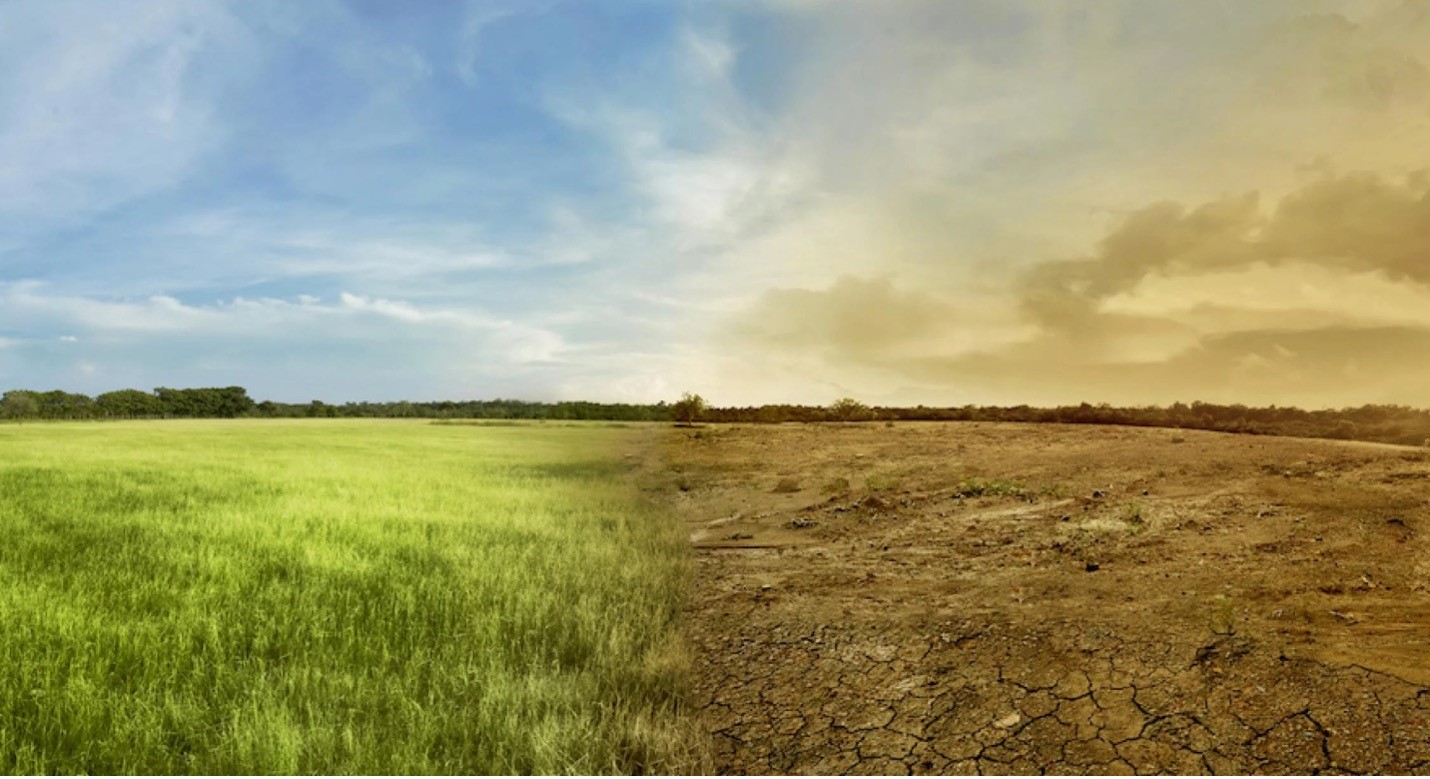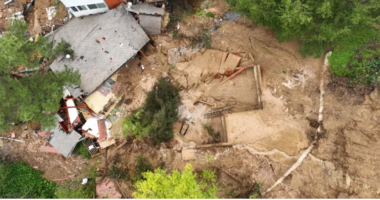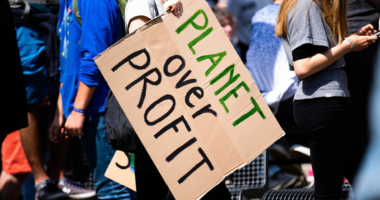Climate, Health and Equity Brief
A flurry of dire reports urge global leaders to act
November 21, 2023

The Climate, Health & Equity Brief is GMMB’s take on the last two weeks’ news on the current impacts of climate change. If you haven’t subscribed yet, you can do so by clicking here.
Hot Topic: A sobering landscape. As the twenty-eighth UN Climate Conference approaches, a flurry of reports setting the stage and marking the urgency for global leaders to act has arrived. All paint a sobering picture of the planetary status quo, underscoring the fact that business-as-usual talks without significant and urgent action will leave humanity in peril. Study findings include the following:
- Little more than five years remain to reduce emissions before surpassing the Paris Agreement threshold of 1.5°C (2.7°F) of post-industrial warming globally;
- Current emission reduction plans by countries worldwide will only reduce emissions by 2% (compared to 2019 levels) by 2030, far short of the 43% needed;
- U.S. emissions decreased less than 1% annually between 2005 and 2019, far short of the necessary 6% average annual decline required;
- 41 out of 42 indicators of climate progress are off track for limiting warming to 1.5°C, and
- Promises of climate adaptation funding for developing countries must increase 10 to 18-fold—or by hundreds of billions more dollars per year—to meet current needs.
And as progress lags, a range of additional reports this month show that climate change is dramatically increasing the frequency and intensity of drought, food insecurity and heat-related deaths in regions across the globe, exacting a significant human toll before the Paris Agreement threshold is even reached.
In one sign of hope, the U.S. and China—which together make up 38% of the world’s greenhouse gas emissions—reached an agreement last week to increase green energy, displace fossil fuels, and reduce emissions. Experts hope the rare point of agreement between the two major polluters will help catalyze further action at a COP28—action that could not be more necessary nor come at a more urgent time.
Human Health
According to new estimates released last week in Nature Climate Change, humans have until approximately 2029 to curb carbon emissions before surpassing the Paris Agreement’s 1.5°C warming limit —several years earlier than anticipated. (The New York Times)
Scientists analyzing regional precipitation and temperature data in the Middle East from 2020-2023 found that climate-fueled extreme temperatures made drought 25 times more likely in Iraq and Syria and 16 times more likely in Iran, acting as a multiplier for a humanitarian crisis fueled by regional instability. (NBC News)
Droughts, drier soils, increased dust storms, and more frequent wildfires are contributing to a dramatic rise of a flesh-eating fungus in the American Southwest, with infections in California increasing 800 percent from 2020 to 2022 and scientists warning it could spread to a much wider area in the face of the changing climate. (The Washington Post)
The new Lancet Countdown on Health and Climate Change shows that climate-related impacts on human health are intensifying, with heat-related deaths among people 65+ increasing by 85% since the 1990s and 127 million people globally facing food insecurity due to heat waves and droughts in 2021 alone. (The New York Times)
Planetary Health
A new UN report warns that global efforts to make significant emission cuts continue to fall short, and that even if nations met their current climate commitments, emissions would still increase by 8.8% by 2030 compared to 2010 levels — only a marginal improvement from last year’s assessment. (Axios)
The Fifth National Climate Assessment warned that a decrease in planet-warming pollution is not happening at a fast enough pace to meet U.S. goals or to stop Earth from warming at least 1.5°C (2.7°F), and that while CA, FL, LA, and TX are feeling the impacts of climate change more than others, no U.S. state is safe from the increasing impacts of climate change. (CNN)
The World Resources Institute’s State of Climate Action 2023 found that progress to limit warming to 1.5°C lags significantly behind the pace and scale necessary to address the climate crisis in 41 of 42 indicators assessed, with only electric passenger vehicle sales on track to meet targets. (TIME)
According to new research, the vast ice platforms in northern Greenland, crucial for holding back trillions of tons of ice and keeping sea levels lower, have lost 35% of their volume since 1978, leaving just five shelves and threatening potentially “dramatic” consequences for sea level rise. (CNN)
New research shows that thunderstorm-related damaging winds now occur five times more frequently across the central U.S. compared to 40 years ago, threatening power grids, crops, people, buildings, and livestock. (Bloomberg)
Equity
The UN’s recently released Adaption Gap Report finds that climate funding to developing countries needs to increase by 10 to 18 times—or hundreds of billions more dollars per year—to help them adapt to the increasing climate devastation caused almost entirely by the fossil fuel use of rich, industrialized countries. (The Washington Post)
Findings from a new Global Climate and Health Alliance study show that countries from the Global South—led by Colombia and Mali—tend to have the most ambitious strategies to target air pollution and its health impacts, while major polluters like G20 countries continue to fall short. (The Guardian)
Negotiations on a climate damage fund to help developing countries deal with the fallout from climate change have stalled ahead of COP28 due to the inability of countries to agree on who would pay for the fund, who would benefit, and how the fund would be structured. (POLITICO)
Politics & Economy
A startling new report shows that the world’s largest fossil fuel producers are still on track to produce 110% more oil, gas and coal through 2030 than the critical 1.5°C warming threshold allows, underscoring the wide gap between nations’ climate action promises and their actual fossil fuel production plans. (The New York Times)
Even as extreme weather intensifies around the globe, all remaining GOP presidential candidates want the U.S. to continue to expand oil production, and the two who admit climate change is real suggest urging countries like China and India to reduce emissions rather than supporting policies for the U.S. to do so. (NPR)
Decreased rainfall in the Panama Canal has reduced trips through the canal by 50%, forcing carriers to either journey to the Suez Canal or around the bottom of South America, increasing time and fuel usage. (Bloomberg)
Action
The U.S. and China, which together comprise 38% of the world’s greenhouse gas emissions, reached an agreement to increase green energy, displace fossil fuels, and work to reduce emissions, which could be seen as a potential catalyst for further action and discussion at COP28. (The New York Times)
Life as We Know It
A new study from Durham University suggests that graphic warning labels like those on cigarettes could help people limit their meat intake—a climate goal that is especially important for countries like the U.S. and the U.K., which need to slash their meat consumption to meet their net-zero goals. (The Guardian)
Kicker
Looking for help adapting to a changing climate? The U.S. Climate Resilience Toolkit provides searchable resources and subject matter expertise from across the U.S. federal government in one easy-to-use location.
Lives and livelihoods are being lost and destroyed, with the vulnerable suffering the most. Yet as needs rise, action is stalling.
– U.N. Secretary-General António Guterres
The GMMB Climate, Health & Equity Brief would not be possible without the contributions of the larger GMMB team—Aaron Benavides, Stefana Hendronetto, Nikki Melamed, Sharde Olabanji and Marci Welford. Feedback on the Brief is welcome and encouraged and should be sent to CHandEBrief@gmmb.com.






